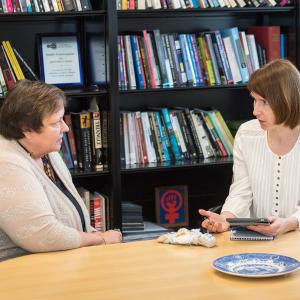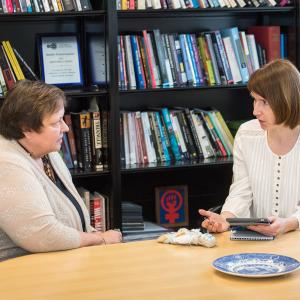2015-16 Visiting Scholars: Olena Strelnyk and Ji Liu


This article was originally featured in the Fall 2016 issue of Genderscapes, IRWG's annual newsletter.
University of Michigan faculty and graduate students often find a home at IRWG as part of a community of scholars from a diversity of fields, who are brought together by their shared commitment to the study of women, gender, and sexuality. IRWG can also be a home for scholars from outside Michigan, or even the United States. Through the Visiting Scholars Program, IRWG welcomes faculty, postdoctoral scholars, and researchers from other institutions around the nation and the world for up to one year. Visiting Scholars have offices in Lane Hall, as well as opportunities for mentorship, networking, and participation in campus intellectual offerings.
Visiting Scholars enrich IRWG as well, bringing their unique personal and cultural experiences to Lane Hall and the greater university community.

Olena Strelnyk
Department of Sociology
Taras Shevchenko National University of Kyiv, Ukraine
Olena Strelnyk came to IRWG from Ukraine in January 2016 as a Carnegie Research Fellow. The grant, specifically designed for scholars from post-Soviet states, enabled her to spend nearly four months in the U.S. (her first time in the country) researching in the library and regularly meeting with IRWG director Sarah Fenstermaker to discuss the theoretical perspectives and direction of her work.
Strelnyk studies mothers’ activism in Ukraine. Her research, she explains, “focuses on the discourses and practices of women’s groups and organizations acting ‘as mothers’ and whose activism in its multiple forms is a reaction to the current armed conflict in the East of Ukraine” (also called the War in Donbass). While at IRWG, Strelnyk explored “how maternal activism is practiced and articulated, and by what gender ideas and expectations it is sustained.”
In applying the concept of “gendered movements” (Einwohner, Hollander and Olson, 2000), Strelnyk’s research demonstrates “how mothers’ initiatives and protests related to war are gendered in different ways, explicitly or implicitly.” Activist groups are characterized as maternal through their organizations’ names, including the Mothers Union Defense and The Committee of Soldiers’ Mothers of Ukraine, which seek to defend soldiers’ rights. Mobilizing as mothers of active duty soldiers, Strelnyk explains, “resonates with the militaristic political discourse in Ukraine: A mother may defend her interests publicly, but only as a soldier’s mother, while other women’s civic activity could be marginalized as non-urgent under the circumstances of war.” The activists’ goals and tactics are also gendered in their focus on women’s roles as caregivers and protectors of their children, argues Strelnyk, using slogans such as “There’s no such thing as ‘someone else’s children’” and “Mothers have no nationalities.”
While Strelnyk made use of U-M’s vast archives, she was also a regular attendee at campus events and lectures. Meeting faculty, students, and staff from around the university expanded her world view and gave her new ideas to bring to her teaching. She describes her time in Ann Arbor as “definitely the greatest experience in my academic life.”
Now that she’s back in Ukraine, Strelnyk will complete a paper on the research she pursued while at IRWG, as well as her first book entitled Mothers’ Practices in Contemporary Ukraine. She will also take part as a coordinator and analyst for a social project called “A City through Women’s Eyes” in Poltava. In September, she’ll begin teaching sociology courses at Poltava National Technical University. Strelnyk plans to make her classes “more interactive and practically oriented,” based on her experiences at U-M.
Ji Liu
English Department
Foreign Languages College Shanghai Normal University
A gender and translations studies scholar in China, Ji Liu was referred to IRWG’s Visiting Scholar Program by a colleague at Fudan University, who praised U-M’s reputation for gender and interdisciplinary studies. Liu had received a grant from her institution, Shanghai Normal University, to study abroad for one year to work on her research project, “Translating Women Poets in China, 1919-1939.” Upon receiving the award, she sought placement at an institute that was both compatible with her research interests and could offer a broad academic experience. She found what she was seeking at IRWG.
Liu’s research focuses on three women poets: Elizabeth Barrett Browning (1806-1861), Christina Rossetti (1830-1894), and Sara Teasdale (1884-1933), whose poetry was translated into Chinese in the early 20th century, during the late Qing Dynasty and early Republic of China. By exploring the translations and transformations of their poetry and the conflicts between gender norms, translation and aesthetic norms, and cultural values, Liu hopes to uncover “the cultural, institutional and historical forces in producing women poets and their poetry” at this time in China.
Since she arrived in Ann Arbor, Liu has pursued her research in the library, spending “a lot of time searching materials that could not be found in China.” In addition to her own research, Liu has sought out other academic experiences on campus, attending lectures and courses offered by IRWG, the Center for Chinese Studies and the English and Comparative Literature departments, where she has learned about innovative research and pedagogical strategies. Dr. Liu teaches translation studies at Shanghai Normal University.
“Having lived in Ann Arbor for half a year, I observed a lot and reflected a lot. The most valuable part of my time [has been] the communication and interaction with the people I encountered here,” says Liu. She credits her experience with helping her to better understand her own country and people, as well as deepening her research and academic scholarship. Two lectures held in Lane Hall had particular impact for her. The public talk and photography exhibition by Chinese feminist organizer Lü Ping and a talk by Chinese LGBT scholar Qian Wang “really opened my mind,” says Liu, “...what they had done for the vulnerable groups moved me. I invited Qian for a coffee before he left U-M, and learned a lot about [the LGBT community] and its condition in China. He dispelled much of my perplexity and bias. They also remind me of the significance of looking beyond the ivory tower.”
Reflecting on her interactions with other scholars and faculty at IRWG, Liu cites her regular conversations with fellow Visiting Scholar Olena Strelnyk: “We discussed many things about women’s rights, marriage, childcare, ideological control, social values in Ukraine and China.” When she returns to Shanghai in December, Liu intends to further her gender scholarship and share her experiences, both tangible and intangible, with her colleagues and students.
